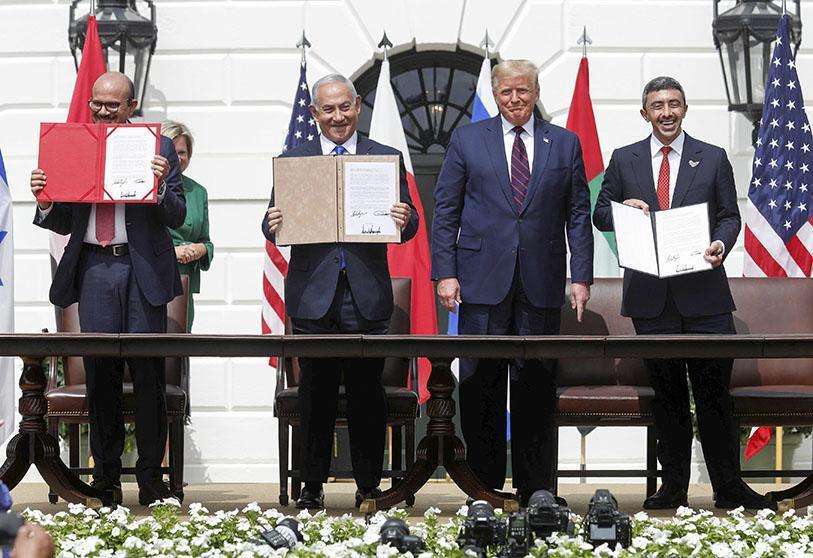30 years after the Madrid Conference that brought Israelis and Palestinians together

After decades of conflict, Israelis and Palestinians sat down for the first time to negotiate, 30 years ago today, at the Madrid Conference, the first stone of a peace process that has run aground three decades later, without putting an end to the Israeli military occupation or achieving the creation of a Palestinian state.
The three-day meeting at the Palacio Real in Madrid was, for the Palestinians, the first time that their maxim of "peace for territory" was put on the table as a starting point for a state of their own; while for the Israelis it implied recognition by their Arab neighbours of the right of the state of Israel to exist.
Bringing Jordan, Syria and Lebanon, as well as the Palestinians, together with Israel at this meeting was the quid pro quo paid by the US, which hosted the conference with the support of the collapsing USSR, for the Arab world's support for the Gulf War (1990-91) eight months earlier.

"I am here. You can no longer deny my existence", cried the late Saeb Erekat - number two on the Palestinian team in Madrid and chief negotiator from 1995 to 2003 - with the black and white Palestinian "kufiya" over his shoulders, looking Israeli Prime Minister Isaac Shamir in the eye, alluding to the presence in the room of Palestinians, represented by others in the past.
Israel, with US support, opposed the presence of the Palestinian Liberation Organisation (PLO), led by a Yasser Arafat then in Tunis, as an entity in its own right and did not recognise it as a valid interlocutor until 1993, but a Palestinian representative was present as part of the Jordanian delegation.
"The event was a success. It created many serious and justified expectations," Ghassan Khatib, one of the Palestinian representatives who participated in the conference, told Efe, then as a young Palestinian activist who later became a minister in the 2000s.

The Madrid Middle East Peace Conference then led to the secret negotiations in Washington that resulted in the 1993 Oslo Accords, "a problematic and disappointing pact that deviated from the groundwork laid in Madrid", says Khatib.
For Khatib, who participated in the peace negotiations until 1993, the Palestinian leadership sacrificed too much in Oslo and made the "grave mistake" of accepting that there was no mention in the agreement that Israel should halt settlement expansion in the occupied territories.
"Oslo achieved a de facto end to the war situation and put an end to the First Intifada, but it did not end Israel's military occupation and did not give us Palestinians the right to self-determination, a situation that continues to this day, 30 years later," laments the Palestinian negotiator.

For Zalman Shoval, Israel's ambassador to Washington in 1990-93 and 1998-2000 and negotiator in this peace process, Madrid's main success was that it opened the door to the normalisation of diplomatic relations with Jordan, sealed in 1994, a country that has played a key role since then as an interlocutor in this conflict.
"Syria had no interest in bilateral negotiations as we did, and the Lebanese just followed the Syrians. With the Palestinians, we later learned that they were taking direct orders from Tunisia from Arafat and they were just propaganda. The one with whom we really made progress in Madrid was with Jordan," Shoval recalled in a conversation with Efe.
The Madrid Conference also produced a formula for Palestinian self-government that culminated in the creation in 1994 of the Palestinian National Authority (PNA), presided over today by an octogenarian Mahmoud Abbas, whose popularity is in free fall, without a clear successor and without power in the Gaza Strip, governed by the Islamist Hamas movement.

Given this situation, Shoval admits that the chances of reviving the peace process, which has been at a standstill for more than a decade, are "practically nil" and criticised the fact that the Palestinians "have not yet expressly recognised Israel's right to exist, but have only accepted it de facto".
The former ambassador asserts that the Abraham Accords, "the most important step since 1948 in relations between Israel and the Arab world", have changed the correlation of forces and that "the two-state solution is no longer relevant in this new context".

However, Khatib, with whom he sat face to face 30 years ago today in Madrid, still hopes to see a Palestinian state, with all rights and freedoms guaranteed, because in the new generations of Palestinians they retain "the commitment to struggle and resistance" of their fathers and grandfathers, which "sooner or later will lead to a state of their own".










